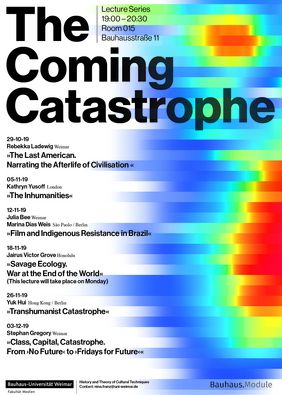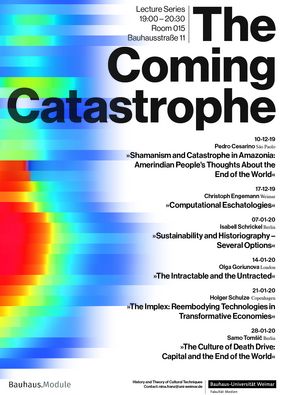»The Coming Catastrophe« – Ringvorlesung im Rahmen der Bauhaus.Module
Nina Franz, wissenschaftliche Mitarbeiterin an der Professur »Geschichte und Theorie der Kulturtechniken« der Fakultät Medien, organisiert zum Wintersemester 2019/20 eine Ringvorlesung mit renommierten internationalen Gastdozierenden. Die englischsprachigen Veranstaltungen rund um die Thematik der anthropogenen Klimakatastrophe finden ab 29. Oktober 2019 jeweils dienstags von 19 bis 20:30 Uhr im Seminarraum 15 der Bauhausstraße 11 in Weimar statt. Interessierte Zuhörerinnen und Zuhörer aller Fachbereiche sind herzlich eingeladen. Als Teil des Moduls wird auch ein begleitendes Lektüreseminar angeboten.
The coming catastrophe poses a challenge to thinking. Only recently have the interrelated events of human-induced climate change and mass extinction begun to unfold as a global media event of proportional magnitude. The proliferation of discourses around impending anthropogenic doom seems to have reached a virtual tipping point, from which there is no return to a “business as usual”-attitude. As the environmental conditions on which all human life depends change in ever more alarming rates, there seem to be few aspects of life, of policy making, and of theoretical work, that can remain unchanged.
But what are the questions that the coming catastrophe – as a current catastrophe – poses? And what responses are formulated within the academic disciplines that are commonly subsumed under the name of “the humanities”? What reconfigurations of methods, of research topics, of collaboration and of “thinking together” are due to be taken into account?
Scholars in the field of cultural and media theory, particularly in Weimar, are used to observing phenomena of change in terms of their historical becoming. While the identification of the historical causes (and causers) of anthropogenic change is decisive for the assessment of “what there is to be done”, the current situation is unique in that it also challenges habitual modes of thinking and forces us to train our eyes on the things to come.
It is this perspective of understanding the university as a place for true experimentation, in finding new methods for building a future and research for the purpose of building society -- Gesellschaftsbau that aligns it firmly in the tradition of the Bauhaus. The progressive demand of changing and modernizing society that was shaped by the Bauhaus in the early twentieth century has to be re-formulated with new urgency in this
new century.
The series of events proposed here are meant as an invitation to launch an open exchange about the types of responses scholars in different fields and subject areas are formulating. Invited speakers are not expected to adhere to the traditions of their field or to align themselves with the current dominant positions in this area, but to seek out their own responses.
Further information can be found online.
For further questions, please contact Nina Franz at nina.franz[at]uni-weimar.de.


